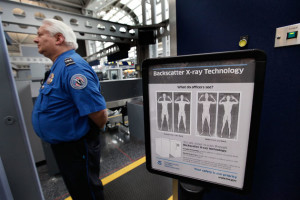TSA Removes X-Ray Body Scanners – blames manufacturers
So. The well-loved TSA has decided to remove its backscatter x-ray body scanners, citing concerns that the manufacturer(s) haven’t been able to come up with viewing software that makes the person being scanned into a generic little stick figure with red boxes where the “dangerous” things are. The US congress have put considerable pressure on the agency to do something about their full body scanners with privacy in mind, and the agency seems to have relented.
There’s a “but”. There always is.
In the last six months or so, some crafty people have proven that the bodyscanners can be fooled. The trick was performed on the x-ray body scanners, just to be sure that’s mentioned properly. Then, there’s the concern that the x-ray body scanners actually cause cancer and diseasein operators who are exposed to them over longer periods of time. Several former TSA employees have come out to say that even a couple of hours close to the machines left some employees with headaches and nausea. There have also been reports of elevated numbers of cancer cases linked to TSA workers at airports that have employed the x-ray body scanners.

Even though it’s hard to link cancer and disease to these machines, they were banned in the EU and EEC for just that reason – there wasn’t enough information to say that the machines were actually safe, and so they were banned from use. This is basically the opposite stance from the one the US and the TSA took – there wasn’t enough information to say the machines were not safe, and so they were put into use in order to still the paranoia.
The discontinued use of the machines is blamed on privacy concerns. There’s no mention of the potential danger of exposing people to repeated (albeit minuscule) doses of ionizing radiation, the complaints of illness or cancer cases, or any other serious charge. This despite the fact that the TSA repeatedly has defended the use of the machines, saying that they can’t store images, people aren’t recognizable, staff is professional and under strict NDAs, etc.
According to John Sanders, the TSA’s assistant administrator for security capabilities:
“We are not pulling them out because they haven’t been effective, and we are not pulling them out for safety reasons,” Sanders said. “We’re pulling them out because there’s a congressional mandate.”
John Sanders is continuing a long tradition with the TSA, namely to assume no kind of blame, what so ever, under any circumstance. They’re simply saying that the body scanners are not being removed for any other reason that there’s a congressional mandate to do so, due to privacy concerns, and that the manufacturers have been unable to provide the TSA with software updates.
The good, the bad and the TSA
There’s one good thing going on here; the x-ray backscatter body scanners are being taken out of airport service. There’s a bad thing here too; the x-ray body scanners are still being used, in the military, and in prisons, and by other US government agencies where “privacy is less of a concern”. That’s not good.
Then, there’s the TSA. The agency which was established as a knee-jerk reaction to 9/11, and which since then has worked diligently to implement as many knee-jerk reactions as possible to both real and imagined “threats” to transport security. While airport security is necessary, and while security theater still is a very valid and effective deterrent, the TSA, probably, is not. They’ve yet to capture any terrorists, you know…
